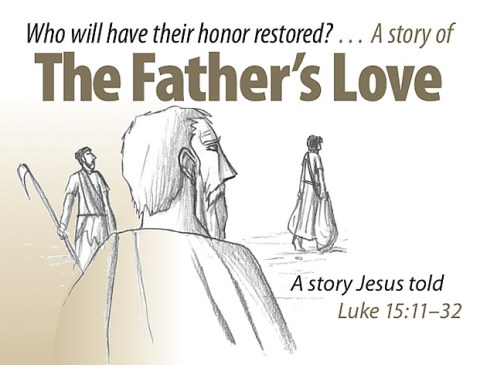Here is a project I have been working on for the past six months … designing, listening, writing, modifying, seeking more advice, rewriting, redesigning … you get the picture. What a learning journey! (Be sure to scroll down—it’s all there!)
Please Note: This post was updated on July 30, 2012 to reflect modifications made to the gospel tract/booklet. The primary change was in the title. The initial title was “Two Lost Sons”; this has been changed to “The Father’s Love”, as this is the main point of the story. Other changes have also been made to reflect this emphasis on the love of the Father. –wm
 It’s a pocket-size booklet that tells the Good News of Jesus Christ through what is commonly known as “The Story of the Prodigal Son.” (Did you know that this story has been often called “the Gospel inside of the Gospel”?)
It’s a pocket-size booklet that tells the Good News of Jesus Christ through what is commonly known as “The Story of the Prodigal Son.” (Did you know that this story has been often called “the Gospel inside of the Gospel”?)
This is currently being circulated for final comments and suggestions. I want to know what you think, too.
It’s been beautiful to be part of a team of followers of Jesus from around the world working together on this project. We’re still awaiting final versions of three illustrations. I am excited about the potential for this to bless many people. I am hoping it will be translated into many languages.
- Developed in a team approach—incorporates ideas from people from America, the Middle East, and Central Asia
- Contains The Story of The Prodigal Son—Luke 15:11–32
- 20 pages, fits into a shirt pocket
- Will also be available in PDF for iPad and Smartphones
- Designed for interaction and easy conversation
- Explains the Gospel of Jesus in the language of honor and shame
- Lovingly designed for people from societies whose pivotal cultural value is honor and shame—to understand the basic message of Jesus Christ
- Will be made available for translation into various languages.
What do you think?





















I really like the concept of this tract. I wish I could come up with something with a very similar concept because it’s important, and I honor you for working on it.
However, my experience of 15 years with Honor & Shame cultures has been cross-cultural and most often with people from an English as a Second Language background, and I really feel that the majority of the wording used in this tract would be far above their English language level – and that religious words used could so easily be misunderstood where people are from a different religious background.
Difficult words in my opinion based upon my experience include ‘squandered’; ‘severe famine’, ‘be fed with the pods’, ‘perish here with hunger’, ‘arose’, ‘compassion’, ’embraced’, ‘worthy’, ‘fattened calf’, ‘entreated’, ‘devoured’, ‘all that is mine is yours’, ‘reckless’/’reckless actions’, ‘despising’, ‘humility and sorrow’/’humble’, ‘self-righteous and arrogant’, ‘humbled’, ‘accused’, ‘conquered’, ‘humanity’, ‘bore (our sins)’
Easily misunderstood religious words include ‘sinned against heaven and before you’, ‘Sinner’/’Sinless’, ‘forgiveness’, ‘repents’/’repentance’, ‘righteous’, ‘blessed’, ‘holy’, ‘glory’, ‘bore our sins’, ‘die to sin’, ‘live to righteousness’, ‘by his wounds you have been healed’, and most of page 19-20.
I love the phrase ‘Do you want to join with others in the honor of following Jesus’ – what a great way of putting it!
I understand why you might have used some of these words, but wanted to express what my experience has shown to see how you feel about that.